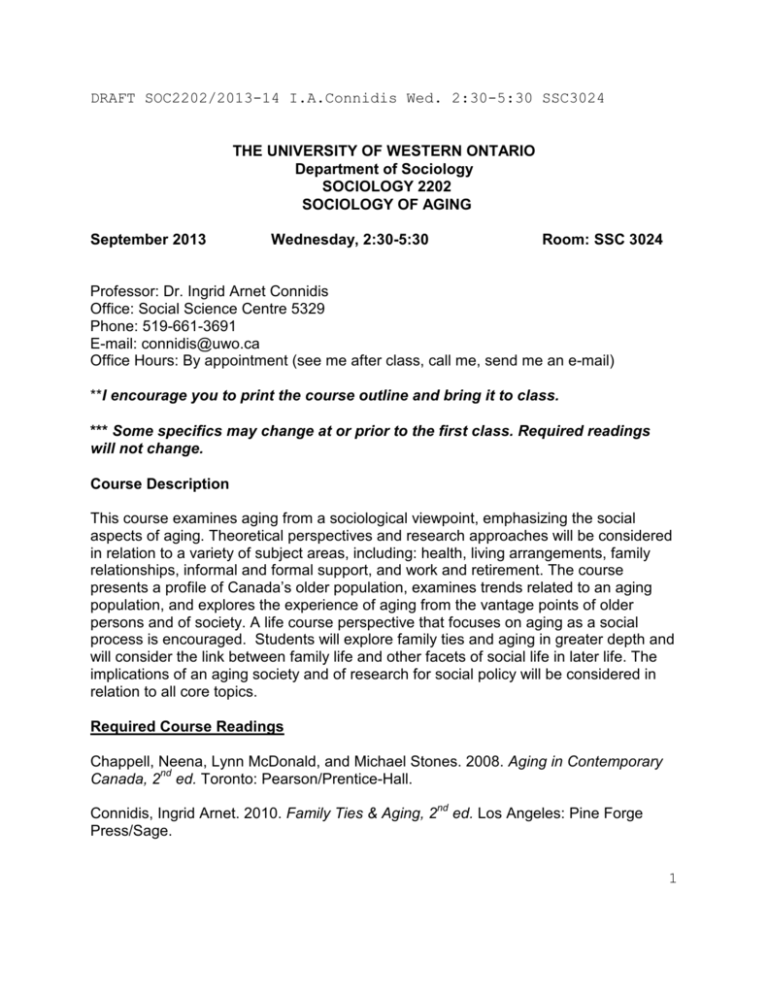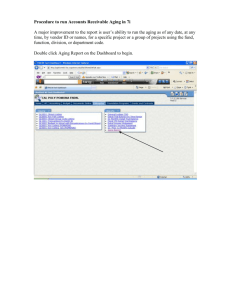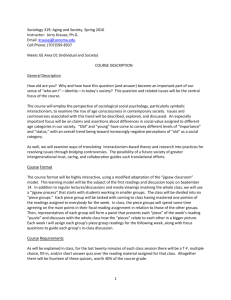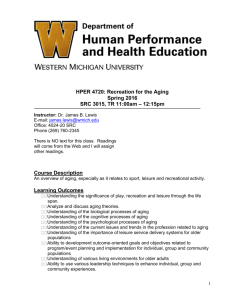
DRAFT SOC2202/2013-14 I.A.Connidis Wed. 2:30-5:30 SSC3024
THE UNIVERSITY OF WESTERN ONTARIO
Department of Sociology
SOCIOLOGY 2202
SOCIOLOGY OF AGING
September 2013
Wednesday, 2:30-5:30
Room: SSC 3024
Professor: Dr. Ingrid Arnet Connidis
Office: Social Science Centre 5329
Phone: 519-661-3691
E-mail: connidis@uwo.ca
Office Hours: By appointment (see me after class, call me, send me an e-mail)
**I encourage you to print the course outline and bring it to class.
*** Some specifics may change at or prior to the first class. Required readings
will not change.
Course Description
This course examines aging from a sociological viewpoint, emphasizing the social
aspects of aging. Theoretical perspectives and research approaches will be considered
in relation to a variety of subject areas, including: health, living arrangements, family
relationships, informal and formal support, and work and retirement. The course
presents a profile of Canada’s older population, examines trends related to an aging
population, and explores the experience of aging from the vantage points of older
persons and of society. A life course perspective that focuses on aging as a social
process is encouraged. Students will explore family ties and aging in greater depth and
will consider the link between family life and other facets of social life in later life. The
implications of an aging society and of research for social policy will be considered in
relation to all core topics.
Required Course Readings
Chappell, Neena, Lynn McDonald, and Michael Stones. 2008. Aging in Contemporary
Canada, 2nd ed. Toronto: Pearson/Prentice-Hall.
Connidis, Ingrid Arnet. 2010. Family Ties & Aging, 2
Press/Sage.
nd
ed. Los Angeles: Pine Forge
1
DRAFT SOC2202/2013-14 I.A.Connidis Wed. 2:30-5:30 SSC3024
Course Requirements *specifics may change and will be confirmed in September.
Students are expected to attend all lectures and are responsible for all material in
lectures (including guest speakers, activities, and films) and course readings. You
should do the assigned readings BEFORE the date indicated on the course outline in
order to facilitate class discussion and to ensure that any questions you may have had
about the readings were addressed in class. If you miss a class, you should borrow
notes from another student.
•
•
•
•
•
Current events assignment
Old Person Profile
Test One (multiple choice)
Test Two (multiple choice)
Final exam
Current Events Assignment
15%
20%
20%
20%
25%
15%
Each week, starting after the first test, students will submit hard copies of 3 different
articles from reputable newspapers or magazines or posted special reports from major
networks (e.g., Globe & Mail, McLean’s, CBC; the Economist; Time; Newsweek; BBC;
not “rags”, not official policy documents, and not research journals) covering current
events (as recent as possible and no more than one year old; primarily Canadian
content or international comparisons that include Canada) that relate to the week’s
topic. These could be news stories, cover stories, editorials, or opinion pieces. The key
is that they are intended for a lay audience and presented by mass media outlets.
Students will briefly describe the article they considered most interesting to the class
and answer factual questions about it (excerpts can be read as well). Students will also
write a two-page (double-spaced, typed, 250 words per page) critical analysis of the 3
articles that relates them to key course themes. You should be explicit about how your
articles relate to course materials. A reference page with full citations (title, source,
date, page number, internet site, date) must be included as part of your submission
(see http://www.lib.uwo.ca/services/styleguides.html for APA or ASA guidelines).
The articles and two-page analysis are due at the beginning of class on the assigned
date.
Specific assignment dates will be determined during the first and second classes. If you
are not there, you will choose from topics that have not already been claimed.
Grading: 5% for presenting one article to the class on the scheduled date; 10% for the
written, critical analysis of 3 articles submitted on the scheduled date.
2
DRAFT SOC2202/2013-14 I.A.Connidis Wed. 2:30-5:30 SSC3024
Old Person Profile
20%
Students will locate a photograph of an old person (known or unknown to the student)
and develop an analytical narrative about that person that reflects key concepts and
knowledge about aging and family ties obtained from the course. Tell about the life of
your subject and relate his or her life experiences to what you have learned about aging
and family ties.
This is a chance to take a more creative approach to writing by applying critically what
you have learned in the course to the life of your chosen subject (real or imaginary).
Discuss ways in which (and possible reasons why) your subject’s experiences fit (and
do not fit) typical patterns for his/her life stage, theoretical perspectives on aging, and
life course trends for his/her demographic profile and position in society (structured
social relations).
Use course materials only.
5 double-spaced typed pages and the photograph (a photocopy is fine) and a reference
page.
Due: March, 12, 2013 (at the beginning of class)
Learning Outcomes
Committed involvement (attending class, keeping on top of readings, participating in
class discussion, working hard on course assignments and tests) in this course is
expected to have the following learning outcomes:
The ability to critically apply core theoretical frameworks and concepts to social
aspects of aging.
The ability to relate core sociological concepts and research to real-life
transitions in middle and later life.
The ability to take a multi-level perspective which relates the political and
economic environment, structured social relations (e.g., age, gender, class),
social institutions (e.g., work and family), interpersonal relationships (especially
with family members) and individual experience to one another.
The ability to critically interpret quantitative and qualitative data related to aging
presented in lay and professional sources.
Improved proficiency in oral communication and writing skills.
3
DRAFT SOC2202/2013-14 I.A.Connidis Wed. 2:30-5:30 SSC3024
**Things You Must Know:
Course Prerequisites
Soc 020 or 021E. Unless you have either the prerequisite for this course or written
special permission from your Dean to enrol in it, you will be removed from this course
and it will be deleted from your record. This decision may not be appealed. You will
receive no adjustment to your fees in the event that you are dropped from a course for
failing to have the necessary prerequisites.
Academic Offences
Scholastic offences are taken seriously and students are directed to read the
appropriate policy, specifically, the definition of what constitutes a Scholastic Offence,
at the following Web site
http://www.uwo.ca/univsec/handbook/appeals/scholastic_discipline_undergrad.pdf
Plagiarism
Students must write their essays and assignments in their own words. Whenever
students take an idea, or a passage from another author, they must acknowledge their
debt both by using quotation marks where appropriate and by proper referencing such
as footnotes or citations. Plagiarism is a major academic offence (see Scholastic
Offence Policy in the Western Academic Calendar).
Plagiarism Checking
All required papers may be subject to submission for textual similarity review to the
commercial plagiarism detection software under license to the University. All papers
submitted will be included as source documents in the reference database for the
purpose of detecting plagiarism of papers subsequently submitted to the system. Use of
the service is subject to the licensing agreement, currently between The University of
Western Ontario and Turnitin.com (http://www.turnitin.com).
Scantron Exams
Computer-marked multiple-choice tests and/or exams may be subject to submission for
similarity review by software that will check for unusual coincidences in answer patterns
that may indicate cheating.
Missed Exams and Late Assignments
Make-up exams will be granted with approved documentation only. If you have a
conflict with one of the exam dates, it is your responsibility to discuss it with the
Academic Counseling office at least one week before the regularly scheduled
exam and provide documentation of the conflict. If approved, you will be allowed to
schedule a make-up exam. If you miss an exam date or the due date for an
4
DRAFT SOC2202/2013-14 I.A.Connidis Wed. 2:30-5:30 SSC3024
assignment due to illness or for any other unforeseen reason, you must provide
notification of and documentation for the reasons for your circumstances to your
Academic Counselor within 48 hours. If your problem is medical in nature, you
should be seen by your doctor on the date of the exam or on the date the assignment is
due. If your Academic Counselor agrees that your reasons are legitimate and are
supported by your medical doctor’s documentation, you will be allowed to write a
makeup exam or hand in your assignment at a later date.
The Social Science Academic Counselor’s office is on the 3rd floor of the SSC (3207).
Compassionate Grounds
Serious Illness of a Family Member: Inform your instructor as soon as possible and
submit a medical certificate from the family member's physician to your home faculty’s
Academic Counseling office.
In Case of a Death: Inform your instructor as soon as possible and submit a copy of the
newspaper notice, death certificate or documentation provided by the funeral director to
your home faculty’s Academic Counseling office.
Make up exams, if approved, will cover approximately the same material but the
questions may vary. If you miss an exam, you must not talk to other students in the
class about what was on the exam.
Drop Box
If you are submitting your assignments outside of class time, please leave them in the
drop box located outside room SSC 5307 in the sociology department. Only
assignments put in the drop box will be date stamped. You will not be able to leave your
assignment in my mailbox.
Grade Guidelines
The Department of Sociology has grade distribution guidelines that all instructors are
required to follow. For Sociology courses at the 2100 and 2200 level:
* A’s are not to exceed B’s, and
* Class averages must be in the range of 66-70%
5
DRAFT SOC2202/2013-14 I.A.Connidis Wed. 2:30-5:30 SSC3024
COURSE SCHEDULE AND READINGS
Please check the Department of Sociology web site (www.ssc.uwo.ca/sociology/) for
class cancellations or changes.
*Note page numbers for assigned readings.
Sociology 2202 First Term
INTRODUCTION
September 11
Introduction. Discussion of course, expectations.
Assign current events topics
*Purchase readings and prepare for next class.
*Bring your readings to class each week.
INDIVIDUAL AND POPULATION AGING: SOCIAL CONTEXTS
September 18
Chappell, McDonald & Stones (CMS). Preface and Chapter 1, pp.
1-11; 20-22. Attitudes and Social Issues that Affect Older People.
CMS, Chapter 10, p. 251, 1st full paragraph; p. 257-top of p. 258
(Typological Models); p. 263, Paragraphs 2 and 3 (Individual
Differences Related to Later-Life and Well-being), Successful
Aging.
September 25
CMS. Introduction pp. xv-xvii.
CMS, Chapter 2, pp. 25-54. Population Aging.
HOW DO WE UNDERSTAND AGING? THEORETICAL PERSPECTIVES AND
RESEARCH
October 2
CMS. Chapter 3, pp. 55-84. Social Theory.
October 9
Connidis. Chapter 1, pp. 13-22. Theoretical Orientation.
October 16 CMS. Chapter 4, pp. 85-113. Knowledge Building and Older People.
Library instruction this week or next (Location TBA)
6
DRAFT SOC2202/2013-14 I.A.Connidis Wed. 2:30-5:30 SSC3024
AGING AND SOCIAL INEQUALITY
October 23 CMS. Chapter 5, pp. 114-135. The Gendered Life Course.
CMS. Chapter 6, pp. 136-166. Aging and Ethnicity.
HEALTH AND AGING
October 30 CMS, Chapter 7, pp. 167-190. Cognitive and Physical Performance.
Detailed discussion of measures and study results are not central.
Review
November 6 CMS, Chapter 8, pp. 191-193; Figure 8.1 on p.196; 197-199; 206-211;
214-217. Mental Well-being and Mental Disorder.
November 13
Mid-term Test (20%)
November 20
CMS Chapter 9, pp. 220-248. Health and Determinants of Health.
CMS, Chapter 16, pp. 417-436. End-of-Life Issues.
SOCIAL INSTITUTIONS: WORK AND RETIREMENT
November 27
CMS, Chapter 13. pp. 328-359. Work and Retirement.
CMS, Chapter14, pp. 360-382. Pensions and Economic Security
for Older Canadians.
December 4
CMS, Chapter14, pp. 382-391. Pensions and Economic Security
for Older Canadians.
CMS, Chapter 15, pp. 392-416. Health-Care System and Policy.
Have a happy and safe break!
7
DRAFT SOC2202/2013-14 I.A.Connidis Wed. 2:30-5:30 SSC3024
Sociology 2202 Second Term
SOCIAL INSTITUTIONS: FAMILIES AND CAREGIVING
January 8
Chappell, McDonald & Stones (CMS), Chapter 11, pp. 270-299. Families
and Aging. (Detailed discussion of particular relationships, e.g.,
siblings, will occur later.)
CMS, Chapter 12, pp. 301-327. Social Support and Caregiving.
FAMILY TIES
January 15 Connidis. Preface and Chapter 1, pp. 3-13; 22-24. Older Persons in a
Family Context.
Connidis. Chapter 2, 25-49. The Availability of Family Ties in Later Life:
Demographic Trends and Family Structure. (Includes Living
Arrangements)
Intimate Ties
January 22 Connidis, Chapter 3, pp. 53-64. Intimate Ties in Later Life
Connidis, Chapter 4., pp. 65-80 (Interdependence; Marriage; Gay/Lesbian
Partnerships). Intimate Partnerships
January 29 Connidis, Chapter 4, pp. 81--92. (The Impact of Life Transitions on
Intimate Ties) Intimate Partnerships
Review
February 5 Mid-term Test (20%)
Intimate Ties (continued)
February 12 Connidis, Chapter 5, pp. 93-106. Being Single in Later Life
February 19 READING WEEK
8
DRAFT SOC2202/2013-14 I.A.Connidis Wed. 2:30-5:30 SSC3024
February 26 Connidis, Chapter 6, pp. 107-136. Transitions in Intimate Relationships:
Losses and Opportunities.
Intergenerational Relations
March 5
Connidis, Chapter 7, pp. 137-152. Exploring Intergenerational Relations.
Connidis, Chapter 8, pp. 153-178. Support Exchanges Between Older
Parents and Their Children.
March 12
Connidis, Chapter 9, pp. 179-186. Childless Older Persons.
Connidis, Chapter 10, pp. 187-203. Grandparents and Grandchildren.
March 19
Connidis, Chapter 11, pp.203-224. Divorce, Remarriage, Step Ties, and
Intergenerational Relations.
Sibling Ties
March 26
Connidis. Chapter 12, pp. 225-240. Sibling Ties in Middle and Later Life.
Connidis. Chapter 13, pp. 241-258. Life Transitions and Sibling Ties.
RESEARCH AND POLICY
April 2
Connidis. Chapter 14, pp. 259-290. Research and Policy: Issues and
Directions.
.
Review for test
Final Test (25%) will be held during the exam period.
Have a happy and safe summer!
9
Social Science
Please contact the course instructor if you require material in an
alternate format or if you require any other arrangements to make
this course more accessible to you. You may also wish to contact
Services for Students with Disabilities (SSD) at 661-2111 x 82147
for any specific question regarding an accommodation.






